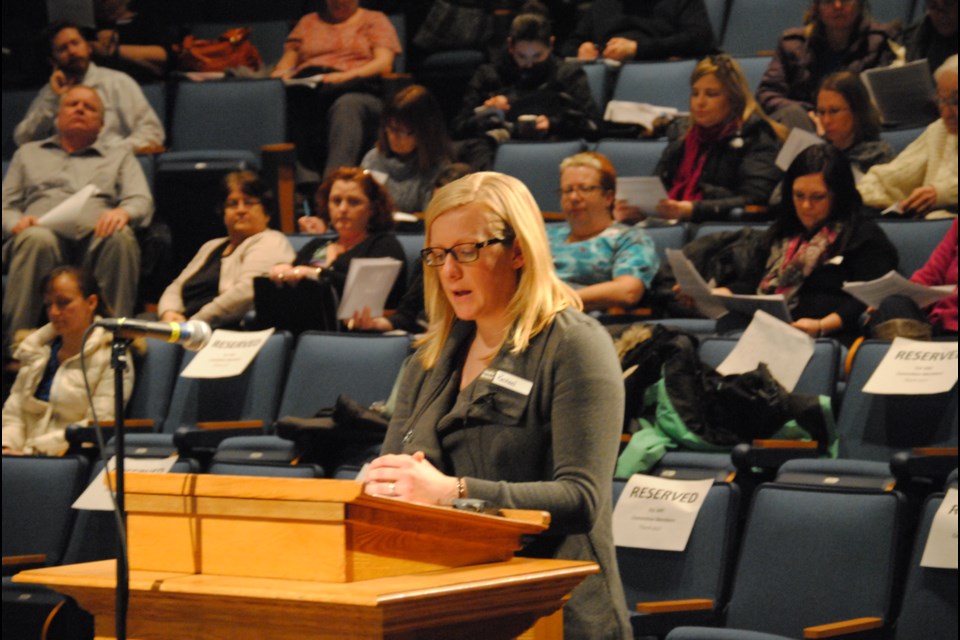Wednesday evening, the Accommodation Review Committee (ARC) held its first of two planned public consultations with community members regarding the "preferred option" of the Near North District School Board (NNDSB), which included public presentations opposing the recommended consolidation of six schools and the construction of two new facilities.
"Funding models have changed," said board principal of capital Gay Smylie. Under-utilized schools are no longer sustainable and the NNDSB faces enormous renewal costs, pegged at $150 million across the board's 40 facilities.
According to the NNDSB, the six schools named in the preferred option have staggering financial needs to continue operating, totalling $84 million. Combined with declining (and projected declining) enrolment, the board must make dramatic changes as funding, as of the last school year, is no longer determined on a "per pupil basis."
The three secondary schools (Widdifield, Chippewa and West Ferris) have combined renewal costs of $69.5 million alone, while the three elementary schools (E.T. Carmichael, E.W. Norman and W.J. Fricker) have renewal needs of another $14.5 million.
The proposal would see Widdifield and West Ferris closed, with all public secondary school students attending a new school to be built on the land where Chippewa currently sits. The school is projected to have in excess of 2,000 students when it would open in 2020 and would serve grades 7-12 students.
The three elementary schools would consolidate, with E.T. Carmichael and E.W. Norman being shuttered, while a new build would take place on the current W.J. property. Students from the three elementary schools would all attend the new school on the W.J. Fricker site, with the school accommodating junior kindergarten to grade 6.
After a 90-minute rehashing of information readily available online or found within the mountains of printed copies piled at the entrance to the theatre at Widdifield Secondary School, members of the public had their turn to express their views on the subject.
And express them, they did. Most focused on the secondary school, its sheer size, and the associated traffic and safety concerns.
Garth Goodhew, a former principal at Algonquin Composite School, West Ferris and Chippewa, wondered if the swift movement on the plan was politically motivated (trustee elections are in 2018) and asked for the board trustees to "slow down the process. There is too much at stake."
Goodhew came out firmly against any plan to house so many students in one school, telling the committee that it "will not be in the best interests of students and it will have a negative effect on our city."
The former principal doubted that all of the programs currently offered at the three secondary schools combined would be properly serviced at a super school.
Goodhew continued, saying, "When recommending this option the staff presents two major arguments -- that this option is the most fiscally responsible one [...] I submit that a responsible business plan could be developed requesting funding for the refurbishing of one or two schools.
"To the trustees -- the decision you make will impact public education and North Bay for the next 50-60 years. Take time to consult widely and to look again at your options. In my view, the current preferred option is not in the best interests of students and not in the best interests of North Bay.
"I made reference to traffic congestion but I also ask you to think about the impact the closing of Widdifield and West Ferris will have on their respective communities. Think about those two communities. I suggest the impact will be great."
Rachael Yerlitz, a mother of two children who currently attend Alliance French Immersion Public School, spoke on behalf of a group of concerned parents whose children are students at Alliance or Vincent Massey.
Yerlitz focused on the magnitude of the proposed Chippewa build. Using NNDSB figures, she said "this super school will house 2,247 grade 7 to grade 12 students. There is no high school in the entire province of Ontario of any of the four school boards that have that many students within one building."
Yerlitz offered an alternative plan that included one JK-grade 6 school and two grade 7-12 schools, keeping one existing school in use and building one new facility. The proposal recommends that West Ferris remain open.
Mayor Al McDonald spoke about the impact the closure of the high schools, especially West Ferris, would have on the community, saying it would "negatively impact long-term health and well-being, and remove critical educational services from [the south] end of the city that services a significant base of our community."
Speaking on behalf of the City of North Bay, McDonald touched on economic development, infrastructure, traffic, and storm water management issues related to a new development at the Chippewa site.
McDonald closed with, "From our perspective, single school solutions, particularly in the case of the single high school solution is not the optimum solution for our youth or our community.
"I do not support the elimination of a high school from West Ferris."
The final public ARC meeting is scheduled for May 8. The board of trustees will meet June 12 to deliberate and will make their final decision June 27.
What are your thoughts on the "preferred option" of the school board to eliminate some schools and consolidate students? Use our comments section below to voice your opinion.



